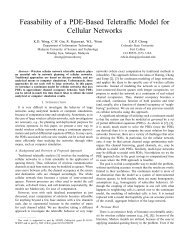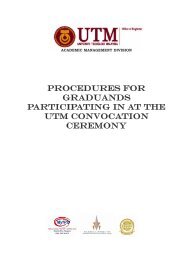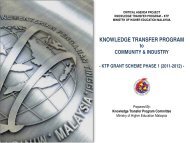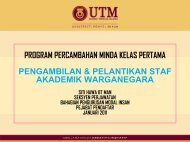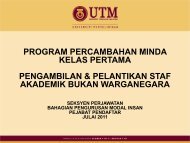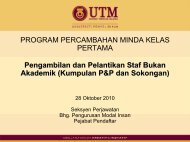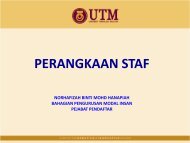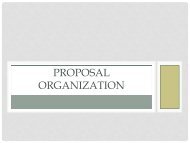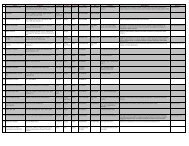PAN ASIA ICT R&D Grants Programme - UTM
PAN ASIA ICT R&D Grants Programme - UTM
PAN ASIA ICT R&D Grants Programme - UTM
- TAGS
- grants
- programme
- web.utm.my
Create successful ePaper yourself
Turn your PDF publications into a flip-book with our unique Google optimized e-Paper software.
Training session in Ifugao<br />
income generation possibilities,<br />
namely through employment and<br />
return to formal education.<br />
The program established low-cost<br />
Computer Livelihood Training Centres<br />
that are sustained by local partners and<br />
offer affordable computer literacy<br />
training for underprivileged Filipino<br />
youth. The training program includes<br />
computer literacy training, life skills<br />
education, entrepreneurship skills<br />
training and employment support.<br />
Of the social workers with whom<br />
the project team work, more than 90<br />
percent were women. In addition, the<br />
gender distribution of the trainees to<br />
date has been very close to 50 percent<br />
male and female. This means both<br />
genders are getting the benefits of<br />
training.<br />
Project Method<br />
The project team established 15 centres<br />
using 250 computers and training 1,500<br />
underprivileged youth every year. The<br />
average implementation cost of a 15computer<br />
centre is kept to roughly<br />
Low Cost IT Centres<br />
$10,000 CAD by leveraging<br />
Canadian equipment donations<br />
(more than 250 computers<br />
donated so far)and the<br />
work of more than 100<br />
volunteers in Canada and<br />
abroad. With monthly<br />
maintenance and operational<br />
cost of $250 CAD, the program<br />
is considered very affordable<br />
for our local partners.<br />
Between 2001 and 2002,<br />
EWB conceptualized and built<br />
the pioneer computer livelihood-training<br />
centre in<br />
Lingayen, Philippines<br />
together with the Technical<br />
Education Skills Development<br />
Agency (TESDA) as the local<br />
partner. The following year<br />
the pilot project was studied<br />
and together with DSWD as<br />
local partner, EWB established<br />
three Centres in the central<br />
Philippines. The <strong>PAN</strong> Asia <strong>ICT</strong> Grant<br />
partly funded this expansion. From<br />
the pilot phase of the project, the team<br />
learned lessons that would ensure<br />
improvement of progressive projects.<br />
First, the team found that there is a<br />
continued need for close monitoring to<br />
ensure long-term sustainability. In<br />
addition, the team found that the<br />
approach to measure impact has to be<br />
robust to allow for objective results.<br />
The team also found it important to<br />
appreciate that computer training<br />
alone is not enough and that the<br />
training must include other soft-skills<br />
in order to be beneficial for the youth<br />
taking part in the project. Implementing<br />
the lessons learned from the pilot<br />
phase, in 2004, EWB and the DSWD<br />
launched an integrated training<br />
program for out-of-school youth. The<br />
project was scaled up and an additional<br />
12 Computer Literacy Training<br />
Centres were established across the<br />
Philippines.<br />
This process of capacity transfer is<br />
on going and the DSWD, assisted by<br />
EWB, continues to expand the project<br />
to new communities across the<br />
Philippines. Through close collaboration<br />
between the EWB volunteers and<br />
the DSWD social workers, both parties<br />
benefit from shared expertise. The<br />
DSWD is able to clearly define the<br />
situation of the Filipino youth in their<br />
communities as well as play a key role<br />
in customizing the project model for<br />
their respective communities, while<br />
EWB trains the center staff in the use<br />
of the computers and orients them<br />
Out of school youth from San Jose del Monte<br />
38



